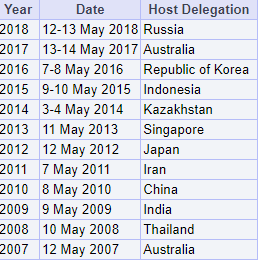Difference between revisions of "Asia-Pacific Informatics Olympiad"
(Created The APIO Wiki) |
(→Host Countries) |
||
| Line 52: | Line 52: | ||
* Delegations must indicate to the host how many students they are entering at least three months before the competition. They should indicate to the host the names of the students at least one month before the competition. | * Delegations must indicate to the host how many students they are entering at least three months before the competition. They should indicate to the host the names of the students at least one month before the competition. | ||
*Future hosts will be decided each year at the IOI. | *Future hosts will be decided each year at the IOI. | ||
| + | |||
| + | [[File:Hosts_(till_2018).PNG]] | ||
| + | |||
| + | The above image shows previous APIO hosts. | ||
== Task Selection == | == Task Selection == | ||
Latest revision as of 05:51, 17 June 2021
The Asian Pacific Informatics Olympiad (APIO) starting from 2007 is a regional informatics competition which involves countries from the Asian Pacific region.The Asia-Pacific Informatics Olympiad is usually held on a Saturday in early May. The first APIO was hosted in 2007 by Australia.
Contents
Regional Delegations[edit]
The following sixteen delegations were invited to participate in the 2007 contest:
|
|
Contest Format[edit]
The contest is a one-day Internet contest, with teams competiting from within their home countries. The contest will run for five hours, and will be held on one of the first two Saturdays of May each year.
- Each delegation must run one or more official contest sites. All students must sit the contest at an official contest site.
- Each contest site must choose a fixed starting time for the contest. Different delegations may start the contest at different times, and different sites from within the same delegation may also start the contest at different times (e.g., one time for an eastern site and another time for a western site).
- Each contest site must be fully supervised, so that it is clear that students adhere to the contest rules.
- Each delegation may enter any number of students, up to a limit of 100. However, only the top six competitors from each delegation will form the official team (see the Results section below).
- Students are eligible for this contest if and only if they are eligible for the IOI in the same year.
Host Countries[edit]
Although the contest is online, there will be a host delegation each year driving the contest to ensure it is both logistically and scientifically successful. The host will rotate from year to year. The responsibilities of the host include:
- Sending invitations and collecting registrations;
- Coordinating task setting and selection (see below);
- Running the contest website
- Collecting and judging submissions, and coordinating appeals.
- Delegations must indicate to the host how many students they are entering at least three months before the competition. They should indicate to the host the names of the students at least one month before the competition.
- Future hosts will be decided each year at the IOI.
The above image shows previous APIO hosts.
Task Selection[edit]
The task setting and selection is done in such a way that everybody has input.
- 4 months before: The host issues a call for tasks. This call is to the wider community, not just the region . Tasks should be of approximately IOI difficulty, but with more forgiving test data.
- 10 weeks before: Task submissions are due. Each delegation in the region should attempt to submit at least one task. Each task should include test data.
- 10–6 weeks before: The host goes through submissions and makes a shortlist of around 10 tasks.
- 6–4 weeks before: The shortlisted tasks are mailed to the leaders from each delegation in the region; together they vote on a final three tasks, plus two backup tasks.
- 4–2 weeks before: Together the leaders edit and refine the official tasks into their final form.
- 2–1 weeks before: Leaders translate tasks into their native languages and submit translations to the host.
- 1 week before: All translations are made available to all leaders; task setting is now complete.
Tasks that were submitted but never used will kept secret, and will be returned to their submitters for use elsewhere. Tasks are approximately of IOI difficulty, but with more forgiving test data.
Results[edit]
After judging is complete, the top six competitors from each delegation will form that delegation’s official team. These official teams will form the official score table, and will be used for deciding upon awards. Awards will be in the form of certificates, labelled Gold, Silver, Bronze and Participation. The guidelines for awarding Gold, Silver and Bronze will be the same as for IOI. The host will provide the certificates, and will bring them to the IOI that year for distribution to other delegate leaders.
